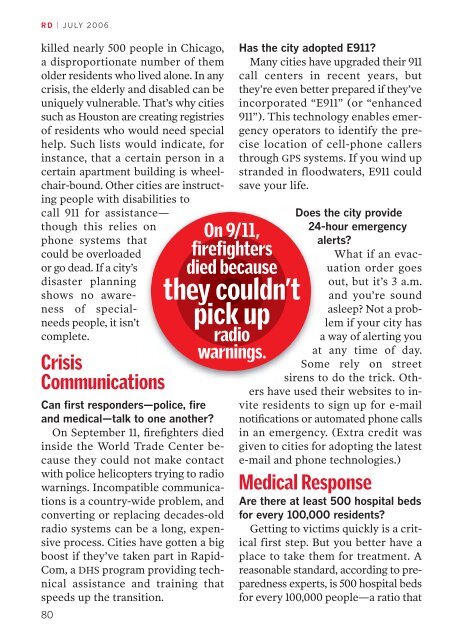You also want an ePaper? Increase the reach of your titles
YUMPU automatically turns print PDFs into web optimized ePapers that Google loves.
RD I JULY 2006killed nearly 500 people in Chicago,a disproportionate number of themolder residents who lived alone. In anycrisis, the elderly and disabled can beuniquely vulnerable. That’s why citiessuch as Houston are creating registriesof residents who would need specialhelp. Such lists would indicate, forinstance, that a certain person in acertain apartment building is wheelchair-bound.Other cities are instructingpeople with disabilities tocall 911 for assistance—though this relies onphone systems thatcould be overloadedor go dead. If a city’sdisaster planningshows no awarenessof specialneedspeople, it isn’tcomplete.CrisisCommunicationsCan first responders—police, fireand medical—talk to one another?On September 11, firefighters diedinside the World Trade Center becausethey could not make contactwith police helicopters trying to radiowarnings. Incompatible communicationsis a country-wide problem, andconverting or replacing decades-oldradio systems can be a long, expensiveprocess. Cities have gotten a bigboost if they’ve taken part in Rapid-Com, a DHS program providing technicalassistance and training thatspeeds up the transition.80On 9/11,firefightersdied becausethey couldn’tpick upradiowarnings.Has the city adopted E911?Many cities have upgraded their 911call centers in recent years, butthey’re even better prepared if they’veincorporated “E911” (or “enhanced911”). This technology enables emergencyoperators to identify the preciselocation of cell-phone callersthrough GPS systems. If you wind upstranded in floodwaters, E911 couldsave your life.Does the city provide24-hour emergencyalerts?What if an evacuationorder goesout, but it’s 3 a.m.and you’re soundasleep? Not a problemif your city hasa way of alerting youat any time of day.Some rely on streetsirens to do the trick. Othershave used their websites to inviteresidents to sign up for e-mailnotifications or automated phone callsin an emergency. (Extra credit wasgiven to cities for adopting the lateste-mail and phone technologies.)Medical ResponseAre there at least 500 hospital bedsfor every 100,000 residents?Getting to victims quickly is a criticalfirst step. But you better have aplace to take them for treatment. Areasonable standard, according to preparednessexperts, is 500 hospital bedsfor every 100,000 people—a ratio that









